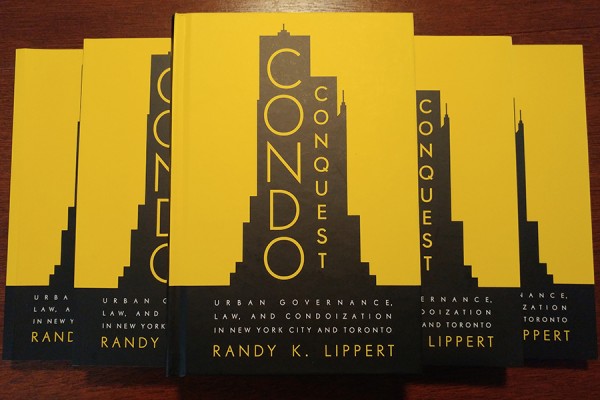 UWindsor criminology professor Randy Lippert has delved into the governance of condominiums in his latest book, Condo Conquest.
UWindsor criminology professor Randy Lippert has delved into the governance of condominiums in his latest book, Condo Conquest.
You’re sold on the idea of owning a home where someone else shovels the walk and cuts the lawn, where you believe you’re joining an instant community. But do you really know what you are getting into when you buy a condominium?
UWindsor criminology professor Randy Lippert has taken a deep dive into the world of condominiums in his new book Condo Conquest. In what is billed as the first major study of condominium governance in North America, Dr. Lippert has researched the trends he says contradict the idyllic notions that swirl though the minds of condo buyers.
“There’s lots of hidden stuff they don’t realize,” Lippert said in an interview about his research for the book. Condo fees that seem reasonable at first begin to increase faster than incomes. Cameras in common areas intrude on your privacy.
“Petty enforcement of rules, a lack of democracy — all the things that plague governments happen in condos,” he said.
Lippert likens condo living to being subjected to another level of government.
“Condos are like sausages,” he writes. “They are made, sold, consumed everywhere in cities…. But, like sausages, little is known about the condo innards, and the less one knows, the better off one may feel.”
According to 2016 statistics, one in eight Canadian dwellings is a condo. In that year, there were 446,000 condo units in Toronto, more than even New York City. They’ve spread across the country to even relatively small municipalities like Kingsville.
When condos first came on the scene in North America in the 1960s, they were governed by volunteer boards made up of residents. That governance has evolved over time, becoming a system captured by property management firms, lawyers, real estate companies, security firms and other non-residents who purchase units for rental income and investments.
It gives way to corruption and fraud, said Lippert. He gives examples of phony ballots getting specific individuals elected to the condo boards. Those people have interests in companies that are later contracted to do landscaping or perform other services for the condo development, Lippert found.
Lippert said he got intrigued by condo governance while doing research in the mid 2000s on gated communities in Kelowna, B.C., and Toronto.
“The fact they had gates was not really that interesting, but the governance was intriguing,” he said.
It was a topic no other researcher had ever tapped.
Lippert and his former graduate students Thomas Bud, Stefan Treffers, and Rhys Steckle spent six years researching and writing the book, focusing on condo developments in New York and Toronto.
The book, Lippert’s 10th, is getting lots of traction in the media, with the Huffington Post and the Literary Review of Canada both publishing stories about it. John Lorinc, writing an article subtitled “the coercive world of condo governance” for the Literary Review of Canada, said, “This book is not a handydandy buyer’s guide. But strangely, it probably should be.”
Lippert is getting invitations to speak at conferences around the globe
He is already working on his next book — an edited collection of chapters that take a global perspective on condominiums. The book will look at the law and governance of condos in eight countries.
─ Sarah Sacheli
